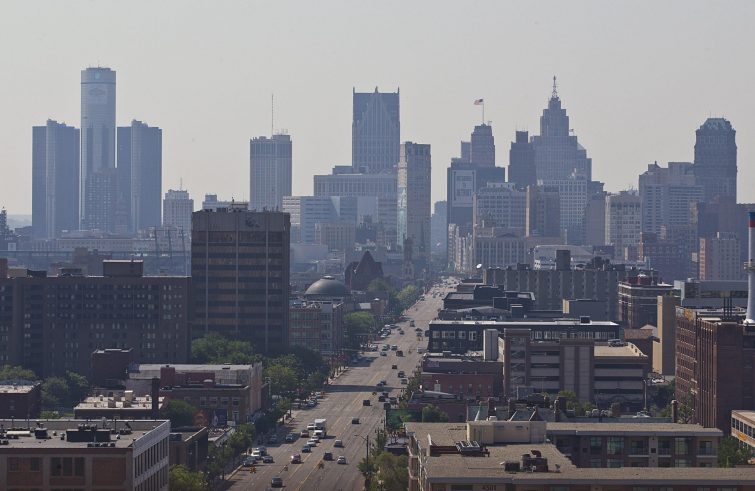
” It is extremely complicated to talk about segregation in the United States today”, said Father Daniele Criscione, PIME missionary in Detroit, interviewed in the latest issue of Popoli e Missione. “Let’s consider the fact that over 500,000 people in the United States were killed by Covid, and the vaccination programmes show that the wealthy, mostly white, come first, followed by everyone else. There is no law against this, but the reality is that the affluent can afford a certain type of medical care, which in this country is private. And thus pay for vaccines. If the wealthy get vaccinated earlier they will suffer fewer deaths from Covid than the rest of the population. That’s how it works.
 A segregating reality. The account of Father Criscione (in the photo), published in the monthly magazine of Fondazione Missio, exemplifies the situation in some areas of the United States. It should be remembered that Detroit’s population comprises a large majority of Afro-descendants. “I’ll give you another example. If you own a house in a white neighbourhood, you will not be able to sell it to a Mexican buyer. Firstly because the real estate agent will never show a house in a white-only neighbourhood to a Mexican, since the property being sold would immediately depreciate in value, as would the houses in the same neighbourhood. However, it would be technically impossible to sell because the neighbourhood is run by what can be described as neighbourhood cooperatives that manage a number of services, such as street lighting and so on. These cooperatives also have a say in the sale of properties in that neighbourhood. In other words, if they don’t like the buyer, you, the owner, are prevented from concluding the transaction. There is no law proclaiming segregation, but the reality in the United States is ultimately one of segregation.”
A segregating reality. The account of Father Criscione (in the photo), published in the monthly magazine of Fondazione Missio, exemplifies the situation in some areas of the United States. It should be remembered that Detroit’s population comprises a large majority of Afro-descendants. “I’ll give you another example. If you own a house in a white neighbourhood, you will not be able to sell it to a Mexican buyer. Firstly because the real estate agent will never show a house in a white-only neighbourhood to a Mexican, since the property being sold would immediately depreciate in value, as would the houses in the same neighbourhood. However, it would be technically impossible to sell because the neighbourhood is run by what can be described as neighbourhood cooperatives that manage a number of services, such as street lighting and so on. These cooperatives also have a say in the sale of properties in that neighbourhood. In other words, if they don’t like the buyer, you, the owner, are prevented from concluding the transaction. There is no law proclaiming segregation, but the reality in the United States is ultimately one of segregation.”
Fluid society with not many roots. And yet US legislation would seem to be among the most developed in combating discrimination. “In fact it is: when hiring, employers must comply with rigorous legislation protecting the employee from possible discrimination on the grounds of race, sex, religion, sexual orientation”. However,
“if an Afro-American wants to live in certain neighbourhoods he or she is not allowed”.
He continues, “they will not let him/her buy a house, no matter how much money that person has. Discrimination happens everywhere in the United States. I would argue that it is rooted in humanity itself, ultimately struggling to accept others, those who differ from their conception of an idealized world. Discrimination stems from fear of otherness. Fear leads to defensive behaviour, to withdraw into a state of indifference, and when people feel it no longer meets their criteria, they pack their things and leave. When neighbourhoods change and people start feeling out of place – the phenomena of gentrification (progressive social and cultural transformation of an urban area) are well studied – they will relocate. American society is very fluid, lacking deep roots.
 Christopher Columbus and the Italians. The Italian missionary continues his reflection referring to some recent incidents that hit the news: “statues of Christopher Columbus, recently torn down for other reasons, were erected a century ago in remembrance of Italians lynched in that place. Italians were mistreated and scapegoated for anything. They were excluded from everything and by everyone.” Do education and culture have the power to change this situation? “It depends where one completes one’s education. Education is key to overcoming this, it’s the only way to overcome ignorance. However, one can have two degrees and still be ignorant. The privatisation of the education system in the States has resulted in customised universities: if you’re a Flat-Earther, you will form your own university and remain one.”
Christopher Columbus and the Italians. The Italian missionary continues his reflection referring to some recent incidents that hit the news: “statues of Christopher Columbus, recently torn down for other reasons, were erected a century ago in remembrance of Italians lynched in that place. Italians were mistreated and scapegoated for anything. They were excluded from everything and by everyone.” Do education and culture have the power to change this situation? “It depends where one completes one’s education. Education is key to overcoming this, it’s the only way to overcome ignorance. However, one can have two degrees and still be ignorant. The privatisation of the education system in the States has resulted in customised universities: if you’re a Flat-Earther, you will form your own university and remain one.”









